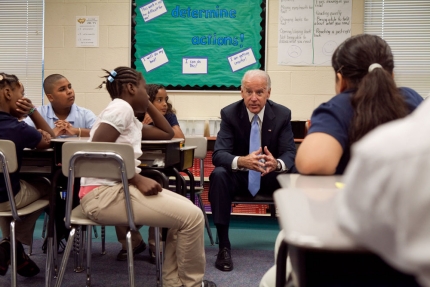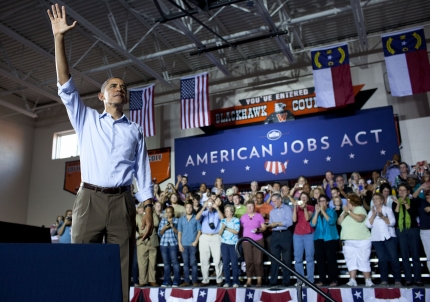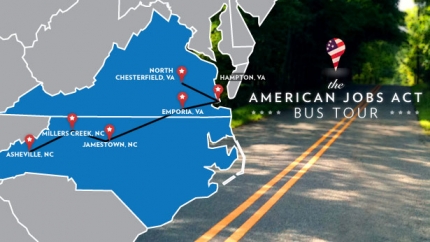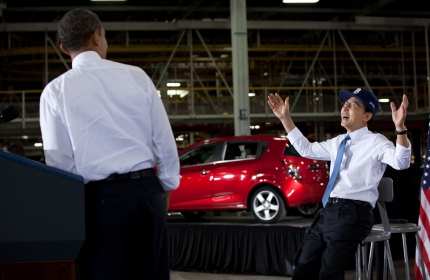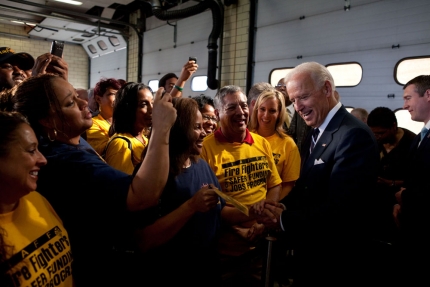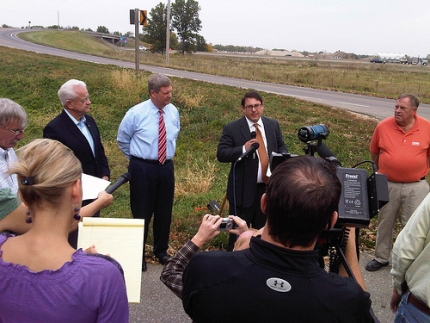Jobs News
The American Jobs Act by the Numbers: 5,600
Posted by on October 19, 2011 at 12:12 PM EST
This morning, President Obama and First Lady Michelle Obama were at Joint Base Langley-Eustis in Virginia as part of the American Jobs Act Bus Tour to discuss how the American Jobs Act will create jobs and put people back to work, including America's veterans.
While the President is on the road, we're pulling out numbers that show how the American Jobs Act will make an immediate impact in communities across the country. Numbers like $5,600, the tax credit for businesses that hire veterans who have been unemployed for six months or longer.
Providing a tax credit incentive for businesses to employee veterans will help encourage hiring and make it easier for America's heroes to find jobs when they return home. And the tax credit rises to $9,600 for hiring veterans who also have service-connected disabilities.
As President Obama said when he first introduced the American Jobs Act to a joint session of Congress, "We ask these men and women to leave their careers, leave their families, risk their lives to fight for our country. The last thing they should have to do is fight for a job when they come home." During the address to Congress, members on both sides of the aisle stood and applauded in support of tax credits for businesses that hire veterans. President Obama is now calling for action:
So when it comes for a vote in the Senate, I expect to get votes from both sides of the aisle. Don’t just applaud about it, vote for it. Vote for it.
First Responders Say the American Jobs Act Will "Allow Us to Respond Safely and More Effectively"
Posted by on October 19, 2011 at 9:53 AM ESTVice President Biden was in Flint, Michigan to talk with fire fighters and police officers about the American Jobs Act.
Right now, local communities across the country are laying off first responders as policymakers struggle with budget cuts in the tough economy. It’s putting public safety at risk.
In Michigan, the Vice President said, "The President and I believe that the single-most basic obligation a government has -- it exceeds -- the single-most basic obligation is to keep its citizens safe. It’s literally -- everything flows from that. All our civil rights flow from being able to be safe in our streets, in our homes, our schools, our businesses. Everything flows from it.”
That's why the American Jobs Act calls for $5 billion for local governments to keep police and fire fighters on the job.
Watch the Vice President and listen to these first responders tell their stories about why these funds are so necessary.
Learn more about EconomyThe American Jobs Act Bus Tour: President Obama Talks Education in Emporia
Posted by on October 18, 2011 at 7:10 PM EST
This afternoon, the American Jobs Act Bus Tour made its way into Virginia.
Just after 3:00, President Obama arrived at Bluestone High School in Skipwith, where he received a tour of a computer lab and met Skrappy -- the robot built by students in the Bluestone Robotics Program.
After handing the President a pair of safety glasses, the high school students demonstrated Scrappy's capabilities.
From there, the President was off to Emporia, where he visited Greensville County High School.
Over the past three years, the high school has cut six teaching positions due to budget cuts. In the year ahead, school officials might need to layoff more teachers if they can't secure additional funding.
Under the American Jobs Act, Greensville County Public Schools -- including the high school -- would be eligible for $1.6 million in federal money for retaining educators.
North Carolina Teacher Explains Why She Supports the American Jobs Act
Posted by on October 18, 2011 at 4:56 PM ESTLinda Phillips is a teacher at Ragsdale High School in Jamestown, North Carolina. She teaches a special support course called Academic Edge that helps ninth graders who read and write below grade level catch up to their peers. Without funding like the American Jobs Act could provide, Phillips’s class may be discontinued and leave these students to fall further and further behind.
Phillips said that her school relies on state funding as well as private grants to support special classes and programs like Academic Edge. State funding has dried up, and if the grant that funds her class isn’t renewed, it will likely be cancelled. Ending the class will set students up for failure, Phillips said. Without this extra help, these students will be poorly equipped to succeed as they continue high school.
Ending programs like Phillips’s class also means cutting the teaching jobs that go with them, leaving teachers out of a job. In fact, nearly 300,000 educator jobs have been lost since 2008 due to state and local budget cuts. Phillips introduced President Obama at an event today in Jamestown where he explained how the American Jobs Act will help put teachers back to work. His plan includes funding to support nearly 400,000 education jobs—enough for states to avoid more harmful layoffs and rehire tens of thousands of teachers who lost their jobs over the past three years. These teachers are sorely needed to give students the time and attention they need to be successful.
Why Teachers Say We Need the American Jobs Act
Posted by on October 18, 2011 at 3:32 PM ESTLenid Keebaugh is a fourth-grade teacher at Goode Elementary School in York, Pennsylvania. The school was forced to cut 11 of its 45 teachers last year due to budget cuts, and Keebaugh says that passing the American Jobs Act will help ensure the school is fully staffed to help students succeed.
Keebaugh said that in addition to cutting grade level teachers, the school also lost all its special subject teachers—those who teach enrichment classes like music, art, and physical education. As a result, the remaining teachers must teach larger classes, and have less time to plan and discuss student progress, which previously took place during enrichment periods. With greater demands on their teachers’ time, students receive less attention and support in the classroom. Besides threatening the students’ academic success, Keebaugh said that the cuts mean they are missing out on things like physical education, which helps teach healthy habits students will carry with them for life.
Vice President Biden spoke at Goode Elementary today to explain how the American Jobs Act would put teachers back in the classroom. The plan includes funding to support 400,000 teaching jobs, including protecting up to 280,000 teachers who are at risk of being laid off due to state and local budget cuts as well as rehiring tens of thousands of teachers who have lost their jobs in the last three years. Putting teachers back in the classrooms does more than create jobs, it helps ensure students are prepared for the future. Keebaugh said that it would be “so fantastic” to get the needed staff back so she and her colleagues can give students the support and attention they need to be successful.
The American Jobs Act will help our schools in other ways, too. The President has proposed a $25 billion investment in school infrastructure that will modernize at least 35,000 public schools. This investment will create jobs while improving classrooms and upgrading our schools to meet 21st century needs. Funds can be used for a range of emergency repair and renovation projects, greening and energy efficiency upgrades, asbestos abatement and removal, and modernization efforts to build new science and computer labs and to upgrade the technology infrastructure in our schools.
The American Jobs Act by the Numbers: 40
Posted by on October 18, 2011 at 1:13 PM EST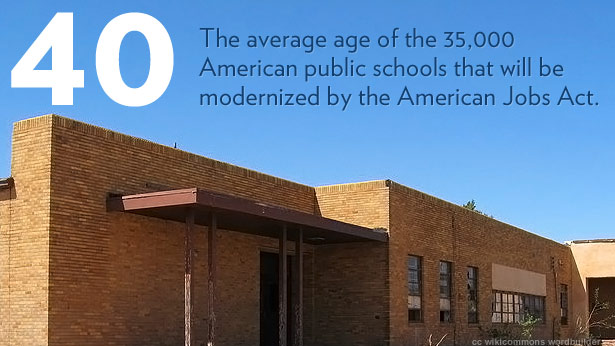
Today, President Obama continues his American Jobs Act Bus Tour to highlight the many aspects of the American Jobs Act that will build an economy that lasts. Investments like preventing up to 280,000 teacher layoffs and putting construction workers back on the job rebuilding America's schools to provide all of our students with a world class education.
This week, we're bringing you numbers from the bus tour that demonstrate how the jobs bill will impact your community; numbers like 40, which is the average age of the American public schools that will be modernized with the American Jobs Act.
The American Jobs Act will invest in retrofitting at least 35,000 public schools across the country, supporting new science labs, Internet-ready classrooms and school renovations in both rural and urban communities. These investments will help give American students the edge they need to prepare for the 21st century economy and compete with students from around the world.
Education Secretary Arne Duncan explained the challenge we're up against:
[Imagine] trying to design the next generation of tablet computers using mainframe hardware from the Eisenhower administration. Or American automakers trying to out-engineer foreign competitors on an assembly line with equipment from the 1960s.
Unfortunately, just such antiquated facilities and barriers to innovation exist today in precisely the institutions that can least afford it: our nation’s public schools. The digital age has now penetrated virtually every nook of American life, with the exception of many public schools.
The American Jobs Act Bus Tour: President Obama at Guilford Technical Community College
Posted by on October 18, 2011 at 11:23 AM EST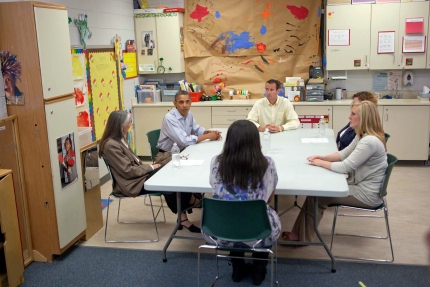
President Barack Obama holds a roundtable meeting with teachers at Guilford Technical Community College in Jamestown, N.C., during the American Jobs Act Bus Tour, Oct. 18, 2011. (Official White House Photo by Lawrence Jackson)
Jamestown, North Carolina is a small community of about 3,000 situated between Greensboro and High Point. It's home to Guilford Technical Community College, where President Obama this morning spoke at a roundtable with educators and addressed a crowd of teachers and students.
As the President sat down for his discussion with the group of teachers and soon-to-be teachers, he talked about how cuts to education at the state and local level have become an alarming trend:
[One] of the concerns that I've had over the course of the last several months -- in fact, the last couple of years -- are the layoffs that we've seen in education and the cutbacks we've seen in education all across the country. States and local governments are under a big crunch. And at precisely the time when we need to be emphasizing education and putting our resources into education, we're seeing cutbacks all across the board. Teachers are losing their jobs. Schools are having to cut back on vital programs that are helping young people.
And the American Jobs Act, the bill that I put before Congress, would help to curb some of those trends.
Now, Congress will have an opportunity to take steps to alleviate the crisis.
Monday in the Senate, Democrats introduced the Teachers and First Responders Act -- a $35 billion program designed to preserve jobs for educators, police officers, and fire fighters. Their proposal is the first part of the American Jobs Act, and Senator Harry Reid, the Majority Leader, pledged to bring it to a vote, perhaps before the end of this week.
But as the President told folks in Jamestown, that's just the first step. The American Jobs Act is about getting people all over the country back on the job:
Congress will have a chance to say whether unemployed Americans should continue to struggle -- or whether we are going to put them back to work, making our schools state-of-the-art; making sure that our roads and bridges aren’t crumbling. They’re going to have a chance to vote on whether or not we’re going to give people who are long-term unemployed a chance to get back on the job and reform our unemployment insurance system, and build a better life. They’re going to get a chance to take a stand on whether we should ask people like me to pay our fair share so that middle-class families and small businesses can get a tax cut.
The American Jobs Act Bus Tour: President Obama Visits West Wilkes High School
Posted by on October 17, 2011 at 6:04 PM ESTIn 1976, President Gerald Ford visited West Wilkes High School aboard Marine One, the presidential helicopter. Today, President Obama dropped in by presidential bus -- as part of the American Jobs Act Bus Tour.
West Wilkes High School is in Millers Creek, North Carolina -- a small town located about 60 miles west of Winston-Salem. On Sunday, more than 1,000 residents lined up for tickets, which were distributed by local volunteers.
Wilkes County is home to around 70,000 North Carolinians and is the birthplace of NASCAR. North Wilkesboro Speedway was home to the first ever NASCAR-certified race on October 16, 1949.
President Obama arrived at the school gymnasium just after 5:00 ET. He was introduced by Dr. Stephen Laws -- the superintendent of Wilkes County Schools -- who thanked the President for the Recovery Act, which he said "saved this country." While the school system is currently operating with more than 100 fewer teachers and administrators than were employed before the recession, Dr. Laws said, not a single teacher has been laid off because of the crisis.
American Jobs Act by the Numbers: 150
Posted by on October 17, 2011 at 3:16 PM EST
This morning, President Obama kicked off the American Jobs Act Bus Tour at Asheville Regional Airport to talk to communities about the pieces of the American Jobs Act that will put more people back to work and more money in the pockets of those who are working.
Throughout the week, we'll bring you numbers from the road to highlight aspects of the jobs bill, numbers like 150 miles. The American Jobs Act includes an immediate investment in employing construction workers to restore 150 miles of runway at American airports and put in place a next-generation air-traffic control system to reduce travel time and delays.
President Obama has made it clear that investing in infrastructure is not a partisan issue and it's time to put those in industries hit hardest by the recession back to work rebuilding America. As the President said, "now people go to Beijing Airport and they say, I wish we had an airport like that. We can't compete that way, playing for 2nd or 3rd or 4th or 8th or 15th place."
Learn more about EconomyThis Week on Treasury Notes: Dismantling the Myths Around Wall Street Reform
Posted by on October 17, 2011 at 1:59 PM ESTEd. Note: Cross-posted from Treasury Notes.
In the fall of 2008, a financial crisis of a scale and severity not seen in generations left millions of Americans unemployed and resulted in trillions in lost wealth. Our broken financial regulatory system was a principal cause of that crisis. It was fragmented, antiquated, and allowed large parts of the financial system to operate with little or no oversight.
Today, our most important challenge is creating stronger economic growth and helping the millions of Americans who lost their jobs get back to work. As part of that effort, we are committed to implementing new rules that will build a safer, more stable financial system—one that provides a robust foundation for lasting economic growth and job creation.
In order to achieve these goals, and help protect our economy from future crises, we must continue with the implementation of Wall Street Reform. However, more than a year after the enactment of the Dodd-Frank Wall Street Reform and Consumer Protection Act, opposition to reform persists.
Opponents are voicing a wide range of criticisms in a concerted effort to slow down, weaken, or roll back reform. Their arguments are misguided. This week, we’ll be taking a look on this blog at what those critics are saying—and rebutting their claims one by one. We begin this series by addressing one of the key misconceptions surrounding reform—its impact on small banks.
Learn more about Economy,American Jobs Act Bus Tour: President Obama speaks at Asheville Regional Airport
Posted by on October 17, 2011 at 10:09 AM ESTThe first stop on the American Jobs Act Bus Tour was Asheville, North Carolina, a city of 76,000 located in the Blue Ridge Mountains.
Air Force One landed at Asheville Regional Airport, where President Obama was greeted by Senator Kay Hagan and Asheville Mayor Terry Bellamy. He spoke just before 11:00.
The American Jobs Act includes a proposal to provide $2 billion to improve safety, add capacity and modernize infrastructure at airports across the country .
Asheville Regional Airport could be eligible for $60 million of those funds. And as the President said, there's plenty of work to go around:
In this airport right here in Asheville, you've got a runway that needs to be widened and repaired. You've got a taxiway that's in the wrong spot –- which means that planes sometimes get too close together. So we could be doing some work right here at the Asheville Airport that would help boost tourism, help to boost the economy here, put people to work right now.
But it's not just here in Asheville. All across the state, you've got highways that need to be built. You've got bridges that need to be fixed. You've got schools that need to be modernized. And that's what America used to do best. We used to build things -- built the Transcontinental Railroad; built the Golden Gate Bridge; the Hoover Dam; the Grand Central Station. There's no reason why we should sit here and watch the best highways and the newest airports being built in China. We should be building them right here in the United States of America. Right here in North Carolina.
This afternoon, the President will stop for a BBQ lunch and later visit West Wilkes High School in Miller's Creek, North Carolina.
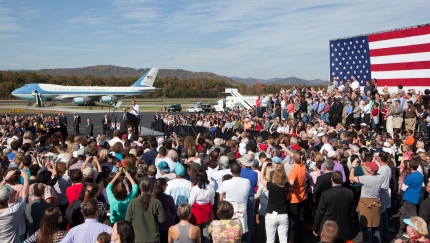
President Barack Obama delivers remarks on the American Jobs Act at Asheville Regional Airport, Asheville, N.C., Oct. 17, 2011. The event kicks off the President’s three-day American Jobs Act Bus Tour. (Official White House Photo by Lawrence Jackson)
Learn more about EconomyThe American Jobs Act Bus Tour
Posted by on October 16, 2011 at 11:00 PM ESTPresident Obama begins the American Jobs Act Bus Tour this morning.
For three days, he'll tour cities in both North Carolina and Virginia -- visiting schools, an airport, a military base, and a fire station. He'll be talking about his plan to put Americans back to work, upgrade our country's infrastructure, and keep teachers and emergency responders on the job.
Last week, Senate Republicans voted to block the President's proposal, playing politics instead of working to grow our economy.
But this fight to create jobs and rebuild our nation's roads and bridges is far from over. On Wednesday, President Obama said:
We will keep organizing and we will keep pressuring and we will keep voting until this Congress finally meets its responsibilities and actually does something to put people back to work and improve the economy.
This bus tour puts a face on the teachers, firefighters, and police officers whose livelihoods are threatened by inaction.
The trip began this morning in Asheville, North Carolina and wraps up Wednesday in North Chesterfield, Virginia.
The first event was this morning at Asheville Regional Airport, where the President spoke about the need to upgrade the nation's infrastructure.
At 5:00 ET this afternoon, the President will speak from West Wilkes High School in Miller's Creek, North Carolina. You can watch those remarks live at whitehouse.gov/live.
You'll also be able to watch the President speak tomorrow from Guilford Technical Community College in Jamestown, North Carolina using the same link. On Wednesday, we'll also stream video of President Obama as he speaks at Joint Base Langley-Eustis in Hampton, Virginia and a firehouse in North Chesterfield, Virginia.
Learn more about EconomyWeekly Address: "Made in America"
Posted by on October 15, 2011 at 4:30 AM ESTFrom a GM plant in Detroit, President Obama highlights the landmark trade agreements passed this week which will support tens of thousands of American jobs, level the playing field for American workers, and help us meet our goal of doubling our exports.
Transcript | Download mp4 | Download mp3
Learn more about EconomyPresident Obama and President Lee of the Republic of Korea Speak in Michigan
Posted by on October 14, 2011 at 4:37 PM ESTEarlier today, South Korean President Lee Myung-bak and President Obama did something out of the ordinary for a state visit: They got out of Washington.
Together, the two leaders toured the General Motors Orion Assembly plant in Michigan -- then spoke to automotive workers.
When President Obama came into office, the plant was in trouble, slated to be closed. But the President made the decision to intervene and save the U.S. auto industry from collapse. Today, more than 1,700 full and part-time employees at Orion are hard at work producing the brand new Chevy Sonic.
President Lee wore a Detroit Tigers baseball cap as he discussed the benefits American workers will see from the new free trade agreement:
"I know, folks, that some of you here may think that with the implementation of the KORUS FTA, that somehow your jobs may be exported or go somewhere else. But let me tell you one thing: That is not true. I am here with President Obama today because I want to give this promise to you, and that is that the KORUS FTA will not take away any of your jobs. Rather, it will create more jobs for you and your family, and it is going to protect your job. And that is the pledge that I give you today."
President Obama then described the trade deal as a "win-win":
"Here in the United States, this trade agreement will support at least 70,000 American jobs. It will increase exports. It will boost our economy by more than our last nine trade agreements combined. And as I said, the good thing is we’ve got a balanced situation. It's not just a matter of folks sending a bunch of stuff here. Koreans are also buying American products. That's what makes it a win-win."
Learn more about Economy, Foreign PolicyVice President Joe Biden Discusses the American Jobs Act in Flint, Michigan
Posted by on October 14, 2011 at 3:10 PM ESTVice President Biden traveled to two Michigan cities this week to highlight how the American Jobs Act would help put cops and firefighters back on the beat and help modernize schools.
In Flint, Michigan, the Vice President made clear how the Jobs Act would both create jobs and protect the nation's "most basic obligation" to keep our citizens safe by putting cops and firefighters back to work. Over the past 18 months, Flint has been has been forced to cut its police force in half due to budget cuts at the same time violent crime has increased in the city.
Nationally, in the past 18 months, 10,000 cops have been laid off around the country, while 30,000 police vacancies have gone unfilled. Thousands of firefighters were laid off between 2009 and 2010, and another 7,000 could face possible layoffs this year.
"It's hard enough to do your job in good economic times. It's a tough job in good times," the Vice President told a group of Flint cops and firefighters assembled inside the city's fire department on Wednesday. "But it's almost impossible to serve the total needs of the community in bad economic times when you get cut in half."
The American Jobs Act includes $5 billion to support public safety jobs across the country. It will also dramatically improve the way cops, firefighters and other first responders are able to communicate with each other during emergency situations by deploying a nationwide public safety broadband network.
"I don't buy people who say there is nothing we can do," said the Vice President. "This is a fight for the soul of this country. It's a fight for the middle class. ... It's about making sure America's fire departments, police departments continue to be a large part of the American fabric and be able to do their job. It's about reversing the cycle of crime and fire and unemployment, and starting a new cycle of jobs and prosperity. It's about keeping you safe so you can keep all of us safe. And it's about a President and I who are prepared to fight like crazy to do whatever we can to make sure that you have the resources to be able to protect us."
Learn more about EconomyWest Wing Week: 10/14/11 or "We Go Together"
Posted by on October 13, 2011 at 11:00 PM ESTThis week, President Obama continued to fight for the proposals in the American Jobs Act that will put folks back to work and grow the economy. The President welcomed the 1985 Chicago Bears and the Tunisian Prime Minister to the White House, traveled to Pittsburgh to convene a meeting of his Jobs Council, attended the Forum on American Latino Heritage and hosted the President of South Korea for an official visit.
Learn more about Economy, Foreign PolicyCongress Passes President Obama’s Trade Measures to Support American Jobs and Exports
Posted by on October 13, 2011 at 3:08 PM ESTLast night, Congress passed four significant trade initiatives President Obama has advanced to help increase U.S. exports that support additional American jobs, and help American workers who need retraining and assistance when their jobs are affected by global competition. The trade agreements with Korea, Colombia, and Panama – which we at USTR worked hard to make better at the President’s insistence – will strengthen and expand ties with strategic partners in Asia and Latin America even as they support tens of thousands of jobs here at home, from shop floors to farms to service firms across our country. And the renewal of Trade Adjustment Assistance (TAA) reforms will ensure that workers get retraining and assistance for the 21st-century jobs they want and need.
As I mentioned last week, when the President sent the legislation to Congress, there have recently been questions about whether trade supports jobs, and how. We have a saying at USTR: “more exports, more jobs.” Because every $1 billion of exports of American goods is estimated to support more than 6,000 additional jobs here at home. And every billion dollars of services exports is estimated to support more than 4,500 jobs. Since these trade agreements are estimated to increase U.S. goods exports alone by a combined total of at least $12 billion, they will support tens of thousands of real jobs and put more money in the pockets of hard-working Americans across the country.
Furthermore, the U.S.-Korea trade agreement will open Korea’s $580 billion services market to highly competitive American companies – creating additional jobs for American service providers in sectors from delivery and telecommunications services to distribution, and energy and environmental services. The Colombia and Panama agreements open up services sectors to American companies selling into those markets as well.
Learn more about , , Economy, Foreign PolicyAmerican Jobs Act in the Heart of Rural America
Posted by on October 12, 2011 at 7:33 PM ESTThis past weekend, I traveled to Iowa to meet with local leaders about the urgent need to pass President Obama’s American Jobs Act. Just as in the other states I visited across the country this past month, the folks in Iowa said loud and clear that they are ready to see the economy flourish again and believe this Act will get us back to work.
On Saturday, I held a White House Business Council meeting with local business, community and agricultural leaders to discuss the Act and what it will do to strengthen the economy in Riverdale and Cedar Rapids, IA. I talked about how—without adding a dime to the deficit—it will provide a tax cut for over 60,000 Iowa businesses, support the jobs of 4,100 teachers and first responders and immediately provide over 5,000 construction workers a job improving highways and other critical infrastructure. In addition, a typical household in Iowa will receive a tax cut of around $1,580.
Learn more about EconomyHelping America’s Small Businesses Build a Clean Energy Future
Posted by on October 12, 2011 at 5:36 PM ESTSmall businesses in emerging industries – like clean energy – have cutting-edge ideas that are strengthening our country and changing the world. Today, we’re helping them continue to do just that in two major ways.
First, unlike larger firms, many small firms don’t have the staff or time to search for all of the federal opportunities that can help them grow and create jobs.
We’re pleased to announce that today, they’ve got a new tool with green.sba.gov, where they can find all federal opportunities in a single location.
How did this come about? For the past year, the U.S. Navy and the U.S. Small Business Administration worked together to help Navy tap into the innovation that is happening throughout America’s strong and growing number of small, clean-energy businesses.
One of the first, simplest efforts was to create a single web page where all of Navy’s green and renewable energy contracts could be easily found by small businesses. Navy created that site in just a couple of months.
When it was completed, we thought, “Why don’t we do this across the entire federal government?”
So we did.
Learn more about EconomyPresident Obama: Americans Want Congress to Do Its Job
Posted by on October 12, 2011 at 5:08 PM ESTPresident Obama today vowed to keep fighting for the American Jobs Act, despite the Senate’s failure to pass the bill that would keep teachers in the classroom, cops on the beat, and put construction workers back on the job while providing tax cuts for middle-class families and small business owners and help our veterans share in the opportunity they defend.
The President was speaking at the White House Forum on American Latino Heritage, where he joined Secretary of the Interior Ken Salazar in celebrating Latino culture, and honoring the contributions that so many Latinos have made to our nation. He also spoke about the struggles facing the Latino community, which has one of the highest unemployment rates in the country during this time of economic crisis, and promised that his focus would remain on to restore a sense of security and fairness for all Americans:
Learn more about Economy
- &lsaquo previous
- …
- 9
- 10
- 11
- 12
- 13
- 14
- 15
- 16
- 17
- …
- next &rsaquo
